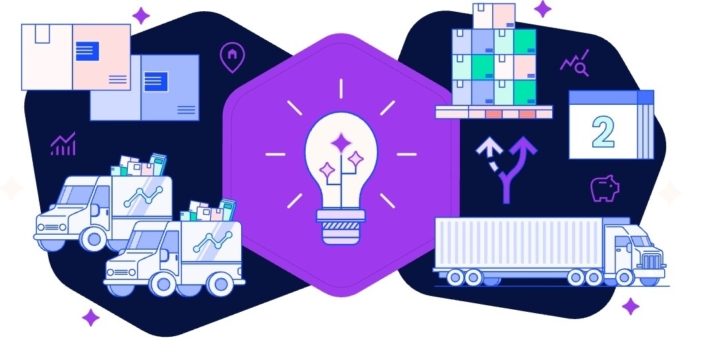You’ve probably heard the phrase, “Work smarter, not harder.” It’s good advice in lots of situations, but especially when it comes to logistics.
Too many businesses choose the hard route for handling shipping and supply chain management. But with smart logistics—advanced tools and automated processes—they can save time, increase profit margins, and improve customer satisfaction.
In this article, we’ll explain what smart logistics is, why it’s the right move for your business, and how to make your parcel shipping smarter.
What is smart logistics?
Smart logistics is the use of technology such as AI, IoT, and data analytics tools to automate and optimize the movement, tracking, and delivery of goods.
The term is often associated with freight and supply chain management, but the core concepts are just as relevant in the parcel shipping space. So whether you’re transporting goods across the country in bulk or sending packages to individual customers, embracing smart logistics can transform your business.
The following technologies are often used in ecommerce smart logistics operations:
- Real-time tracking systems. Tracking systems let you and your customers see where a package is at any moment. They increase transparency, reduce support tickets, and show customers that you keep delivery promises.
- Artificial intelligence and machine learning. AI and machine learning help you make smarter shipping decisions, such as choosing the fastest or most reliable carrier based on past performance. They also power tools that predict delays, suggest cheaper routes, and automate repetitive tasks.
- Data analysis and predictive analytics. Predictive tools dig into your fulfillment data to flag problems before they happen. For example, a system might identify carriers with frequent delays or forecast when you’ll need to restock inventory.
- Cloud computing. Cloud-based platforms make it easy to manage shipping across carriers, locations, and systems by keeping your tools connected and your data accessible without on-premise software.
- IoT (internet of things). IoT devices, such as sensors or smart scanners, collect and share data across the shipping process. In parcel logistics, they help monitor conveyor systems or scan packages in real time to keep things moving smoothly.
- Warehouse management systems. A WMS helps organize everything behind the scenes, from tracking inventory to managing orders and coordinating pick-pack-ship operations.
- Warehouse robotics. Robots can handle tasks like picking, sorting, and moving parcels, speeding up fulfillment while reducing errors. For high-volume shippers, warehouse automation is key to staying fast and competitive.
- RFID (radio frequency identification). RFID tags are mostly used in freight and warehouse environments to track containers or pallets automatically.
These tools allow businesses to run faster, leaner, and more reliable operations.
Three benefits of using smart logistics
When you run an ecommerce business, it’s easy to focus on product development and marketing and let logistics fall to the wayside. You might not see the value in optimizing shipping, and it’s easy to stick with the status quo.
But trust us—switching to smart logistics is worth it.
By automating key shipping and fulfillment tasks, you can reduce costs and improve delivery speed without adding more staff or manual work.
Let’s take a closer look at three significant benefits of smart logistics: better visibility, cost optimization, and improved decision-making.
1. Better visibility
Smart logistics gives ecommerce businesses live access to where their products are, both in transit and inside the warehouse.
- In transit. Real-time parcel tracking tools let you monitor shipments as they move through carrier networks, while notifications flag delays or delivery exceptions as they happen.
- In the warehouse. Inventory management systems keep stock levels updated automatically, reducing the risk of overselling or shipping mistakes.
This level of visibility helps improve delivery reliability and gives customers confidence that their orders will arrive on time and intact.
2. Cost optimization
With smart logistics tools in place, shippers can lower costs and get more done with the same resources.
Automation reduces the need for manual labor during fulfillment by speeding up picking, packing, and sorting.
At the same time, performance data can reveal gaps in processes—like a slow-moving product taking up prime shelf space or a supplier that consistently causes shipping delays. Businesses can use this insight to assign labor more efficiently, improve pick accuracy, and remove unnecessary steps from the supply chain.
While some technologies require upfront investment, the long-term savings in labor, error reduction, and shipping costs often make up for it quickly.
3. Improved decision-making
Smart logistics gives you the data to make faster, smarter decisions at every stage of the shipping process.
Historical delivery performance, current inventory trends, and customer location data can all be used to improve how you route packages, assign carriers, and allocate stock, while predictive analytics helps you prepare for future demand or identify weak spots before they affect your service.
“You don’t want to make decisions on how an order should be packaged and fulfilled and shipped at the time that you’re trying to process the order. That’s a repetitive thing. [The] factors that affect that should be automated.” — Nicholas Daniel-Richards, CEO at Packiyo
What industries benefit from smart logistics?
Smart logistics is helpful no matter what you’re selling. Here are just a few examples of how various industries can benefit from increased automation and visibility:
- Apparel and footwear. Fast-changing trends and high return rates make logistics especially challenging in fashion. Smart logistics helps brands track inventory in real time, speed up fulfillment, and reduce errors that lead to returns.
- Healthcare and pharmaceutical. Healthcare shipments usually require strict handling, fast delivery, and full traceability. With smart logistics, pharmacies can easily monitor temperature-sensitive products, automate compliance checks, and provide real-time tracking for critical deliveries.
- Consumer electronics. Electronics are high-value items that require secure, reliable delivery and often involve complex return processes. Smart logistics provides real-time tracking, signature confirmation, and better visibility into delivery performance. It also allows for faster, more accurate fulfillment, which is helpful for launches, preorders, or peak season demand.
Work smarter, not harder, with Luma
As your parcel shipping grows more complex, smart logistics tools make it possible to move faster and deliver a better customer experience.
To get the most out of your logistics strategy, you need actionable insights, flexible automation, and tools that adapt as your business grows. That’s where Luma by EasyPost comes in.
Luma Insights
Luma Insights gives you a clear view of every parcel, from pickup to final delivery.
With your shipping data at your fingertips, you can stay ahead of delays, lost packages, and other common issues. And if you’re curious about how you compare to the competition, you can compare your shipping performance against similar businesses to see where you stand.
Luma Advisor
Luma Advisor uses AI trained on billions of shipments to recommend smarter ways to ship. Whether you’re testing new carrier combinations or looking to build a more resilient delivery network, it helps you identify the best mix for your business.
Instead of relying on guesswork, you get data-backed recommendations that support long-term planning and real-time optimization.
Luma Select
Luma Select turns your shipping strategy into action, automatically applying the recommendations from Luma Advisor.
It buys labels based on the rules you set—like cost, delivery speed, or carrier preferences—and lets you adjust those rules without needing IT support.
This kind of automation helps reduce errors, avoid missed deliveries, and cut costs without compromising service quality.
Smarter shipping starts here
Smart logistics isn’t just the future of shipping—countless businesses are taking advantage of advanced tools and technologies right now. Are you ready to join them?


